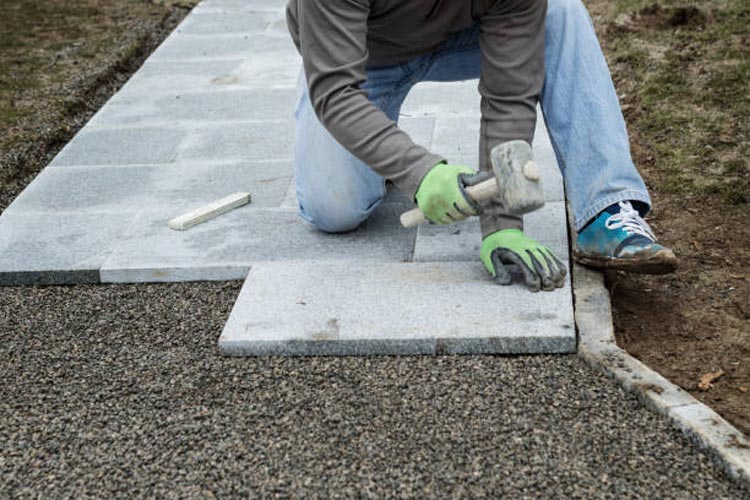
When undertaking any landscape remodel project, choosing the right components is a crucial decision in the landscape design process. Fortunately, landscape pavers have become a go-to for many contractors looking for a great way to transform their client's landscape into a tranquil retreat.
Landscape pavers have become a popular addition to any backyard landscape, but it often leads to confusion because the term is thrown around a lot. To help minimize any misunderstanding, we will look at what landscape pavers are, why they're so valuable in landscape design, and some of the various types available to help you make the best decision for your exterior landscaping.
Keep reading below to learn more to find out why our team of landscaping experts is the preferred choice for Orange County residents.
Concrete paversConcrete pavers are precast, man-made paving stones made from a mixture of cement, sand, gravel, and... are man-made paving stones designed to resemble natural stones. There is a higher uniformity of size, texture, and color because they are made rather than quarried.
Contractors can get into a rhythm when working with uniform materials, making them faster and easier to install. Pavers are also cheaper than quarried stone, though prices vary depending on the style.
Manufactured concreteConcrete is a composite material made from a mixture of cement, sand, gravel, and water. It is one o... pavers have the advantage of being cool in the sun. Even dark-toned pavers won't burn your feet, making them a smart choice for areas where you'll be taking your shoes off frequently.
Pavers typically are utilized in dry-laid patterns. While they can be impressive imitations of natural stone, their homogeneity in broad stretches may appear unnatural. Consider the finished design's sightlines when deciding which concrete pavers will work best for you.
There are a variety of reasons why people gravitate toward this material, including the fact that faux products just don't cut it for some of us.
The term pavers are most usually used to describe concrete paving stones. Pavers made of clay brickClay brick is a traditional building material made from natural clay, molded into rectangular blocks...</brick paversBrick pavers are rectangular, kiln-fired blocks made from clay or shale, used primarily in paving ou... or natural stone are also available. They're usually little bits of varying sizes installed in various colors, textures, and patterns.
The parts connect to create a flexible and strong structure made of paving stones when correctly installed. Because interlocking pavers have so many joints, interlocking pavers are incredibly robust and resistant to cracking and breaking.
The majority of pavers are three to four times stronger than the home's concrete foundation, and that is why they may need less care than the foundation of the house. Where you might frequently hire a company for Foundation Repair in Houston, perhaps you don't have to worry about your landscape pavers that much. Moreover, many of the manufacturers of paving stones give a lifetime warranty on their products.
Most laying pavers are also made with colors and particles that run the thickness of the paver, so if a little chip occurs, it will be less noticeable.
Color can easily be added to poured concrete, but the color fades quickly and will likely need to be repainted every year or two. A protective sealer can be placed on both pavements to help them last longer.
It's vital to keep in mind that the winter weather can have an impact on your backyard patio. The ground expands and contracts during the winter months as the moisture in the ground freezes and thaws. This can happen 90 to 100 times every year in Connecticut.
In warmer climates, the number of cycles per year may be less than ten. Regardless, the patio moves as the ground grows and contracts. This can readily lead to cracks in solid surfaces such as concrete's weakest places.
There are more seams throughout the pavement surface with a paver patio because of the way it is placed, allowing the pavers to individually stretch each cycle, but then settle back into their original position when the expansion subsides.
If suitable building techniques are followed, a properly placed paver patio using concrete pavers can have minimal movement.
Repairs on or under a paver patio are easier and more seamless than those surrounding a concrete patio, where you may wind up having to replace the entire concrete slab. Paver patiosPaver patios are outdoor spaces constructed using interlocking pavers, offering a durable and visual... require very little maintenance.
As needed, sweep or blow any debris off the patio surface. The majority of stains may be easily removed with soap and water. There are numerous cleaners that are intended for the type of stain-food, oil, grease, or rust-that can be used if necessary.
To make maintenance and cleaning even easier, protective sealers can be applied. Sealers also preserve pavers from wear and tear from the elements.
Some sealers may need to be reapplied from time to time, depending on the type of sealer used. They come in a variety of finishes, ranging from nearly undetectable to a film-forming sealer with a wet look.
It's time to figure out which type of paver is best for your project once you've selected how you want to design your front or backyard. When looking for the ideal pavers for you, there are three essential questions to consider.
You want to be sure that the pavers you purchase complement your home and existing landscape features. If you have a brickBrick is a building material made from clay, sand, and water, molded into rectangular blocks and fir... house, you might want to utilize brick pavers to serve as edging stones for your garden bedsGarden beds are designated areas within a landscape where plants, flowers, and shrubs are cultivated.... If your property has an adequate setup of edging stones, a cobblestoneCobblestone refers to small, rounded stones traditionally used for paving streets, driveways, and pa... paver pathway may be appropriate.
If you're creating a landscape feature that people will walk on frequently, like a pathway or an outdoor living space, you'll want to use pavers that are easy to walk on. People may trip if the paver is rough or uneven. A surface that is overly smooth, on the other hand, may become slippery, especially if you're designing pool decksA residential pool deck is the area surrounding a swimming pool, offering space for lounging, entert... that will be wet most of the time.
Ultimately, it's up to you to think about your individual project and consider which paver texture will work best. Furthermore, some pavers are reasonably priced for most homeowners, while others can be extremely costly. Which pavers are suitable for you will be determined by your budget.
These are two low-cost options that would work well for any paver project. Stone from the area will also be less expensive than rare materials that must be shipped. LimestoneLimestone is a sedimentary rock composed mainly of calcium carbonate, often formed from the accumula... and other natural stone pavers are high-end paver materials with a premium price tag.
The most efficient technique to avoid weeds is to apply paver sandSand is a fine, granular material composed of finely divided rock and mineral particles. It is a fun... to the seams between your pavers. If weeds are already growing between your pavers, consider pouring boiling water over them for an eco-friendly weed killer that won't harm the pavers.
Pavers are largely maintenance-free, though most types can be swept, sealed, and cleaned on a regular basis to improve their beauty and longevity. Using a pressure washer on occasion can assist in keeping them clean.
Sealing some types of pavers will help them last longer by reducing stains. Concrete pavers should be resealed every two years or so, especially in areas where there is a lot of traffic and wear.
Unless they come into regular contact with grease and oil, such as around a barbecue grill or cars that leak oil, clayClay is a natural, fine-grained soil material that becomes pliable when wet and hardens when dried o... pavers rarely need to be sealed. To clean brick pavers, wash them with water and a tiny bit of detergent.
Only replace a cracked paver if the crack is wide and visible. Replacing individual pavers may be less expensive than attempting to repair cracks.
Landscape remodels can quickly become overwhelming, and for a good reason, as the paving materials you choose will set the tone for the entire project.
However, as you can see, landscape pavers are an excellent choice for anyone looking to freshen up their outside living area and offer a plethora of styles to pick from, each of which comes in a variety of colors and textures.
Are you ready to get started on your next landscaping project? Trust West Hills Masonry to help.
At West Hills Masonry, our experienced and competent team of specialists go to great efforts to add significant value to your property by complementing your landscape with stunning components. You can trust our team of landscaping specialists to help you create the landscaping remodel you've always wanted.
To receive a free estimate for your next landscape design idea and speak with an expert member of our landscaping team about how we can help you. Discover how we can help, contact us at West Hills Masonry today!
 Carlos Gonzales
Carlos GonzalesLocations We Serve
Schedule A Consultation